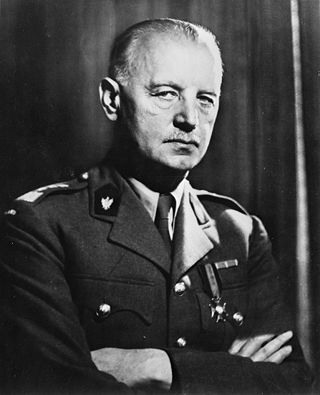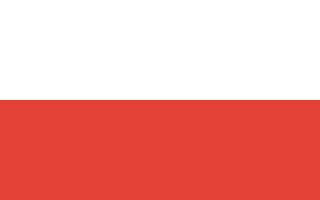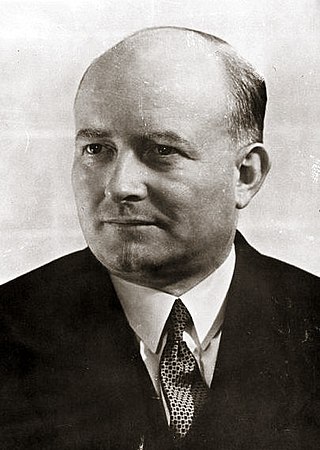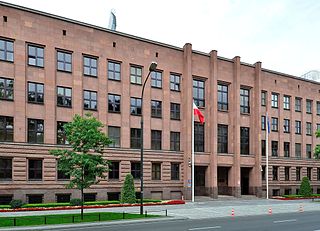| |||||
| Decades: | |||||
|---|---|---|---|---|---|
| See also: | |||||
| |||||
| Decades: | |||||
|---|---|---|---|---|---|
| See also: | |||||

Wojciech Witold Jaruzelski was a Polish military general, politician and de facto leader of the Polish People's Republic from 1981 until 1989. He was the First Secretary of the Polish United Workers' Party between 1981 and 1989, making him the last leader of the Polish People's Republic. Jaruzelski served as Prime Minister from 1981 to 1985, the Chairman of the Council of State from 1985 to 1989 and briefly as President of Poland from 1989 to 1990, when the office of President was restored after 37 years. He was also the last commander-in-chief of the Polish People's Army, which in 1990 became the Polish Armed Forces.

Władysław Eugeniusz Sikorski was a Polish military and political leader.

The Polish government-in-exile, officially known as the Government of the Republic of Poland in exile, was the government in exile of Poland formed in the aftermath of the Invasion of Poland of September 1939, and the subsequent occupation of Poland by Germany, the Soviet Union, and the Slovak Republic, which brought to an end the Second Polish Republic.

Stanisław Mikołajczyk was a Polish politician. He was a prime minister of the Polish government-in-exile during World War II, and later Deputy Prime Minister in post-war Poland until 1947.

Lech Aleksander Kaczyński was a Polish politician who served as the city mayor of Warsaw from 2002 until 2005, and as President of Poland from 2005 until his death in 2010. Before his tenure as president, he previously served as President of the Supreme Audit Office from 1992 to 1995 and later Minister of Justice and Public Prosecutor General in Jerzy Buzek's cabinet from 2000 until his dismissal in July 2001.

Jarosław Aleksander Kaczyński is a Polish politician. He co-founded the Law and Justice (PiS) party in 2001 with his twin brother and has served as its long-time leader since 2003. He served as Prime Minister of Poland from 2006 to 2007, and has twice held the post of Deputy Prime Minister of Poland, first from 2020 to 2022, and a second time from June to November 2023. He is considered to have been the de facto leader of Poland, when PiS formed the government in 2005–2007 and again in 2015–2023, with direct political influence over the prime ministers Kazimierz Marcinkiewicz, Beata Szydło and Mateusz Morawiecki.

The Ministry of Foreign Affairs is the Polish government department tasked with maintaining Poland's international relations and coordinating its participation in international and regional supra-national political organisations such as the European Union and United Nations. The head of the ministry holds a place in the Council of Ministers.
The history of Poland from 1945 to 1989 spans the period of Marxist–Leninist regime in Poland after the end of World War II. These years, while featuring general industrialization, urbanization and many improvements in the standard of living,[a1] were marred by early Stalinist repressions, social unrest, political strife and severe economic difficulties. Near the end of World War II, the advancing Soviet Red Army, along with the Polish Armed Forces in the East, pushed out the Nazi German forces from occupied Poland. In February 1945, the Yalta Conference sanctioned the formation of a provisional government of Poland from a compromise coalition, until postwar elections. Joseph Stalin, the leader of the Soviet Union, manipulated the implementation of that ruling. A practically communist-controlled Provisional Government of National Unity was formed in Warsaw by ignoring the Polish government-in-exile based in London since 1940.

Czesław Jan Kiszczak was a Polish general, communist-era interior minister (1981–1990) and prime minister (1989).

The Provisional Government of National Unity was a puppet government formed by the decree of the State National Council on 28 June 1945 as a result of reshuffling the Soviet-backed Provisional Government of the Republic of Poland established by the Polish Workers' Party through inclusion of politicians from the close political sphere of Stanisław Mikołajczyk, the former prime minister of the Polish government-in-exile based in London. Inclusion of the latter group provided an excuse for the Western allies to approve tacitly the fait accompli of Poland becoming part of the Soviet sphere of influence, and to legitimise the Warsaw government while withdrawing their recognition of the Polish government-in-exile.

Kniefall von Warschau, also referred to as Warschauer Kniefall, refers to West German Chancellor Willy Brandt's gesture of genuflection before a memorial to the Warsaw Ghetto Uprising during a state visit to Poland in 1970. Perceived as a sign of profound humility, images of Brandt's action received world-wide attention. More broadly, the gesture came to symbolise Ostpolitik, Brandt's ultimately successful policy of diplomatically reconciling West Germany with its eastern neighbours following the Holocaust and the Second World War.
The Treaty of Warsaw was a treaty between the Federal Republic of Germany and the People's Republic of Poland. It was signed by Chancellor Willy Brandt and Prime Minister Józef Cyrankiewicz at the Presidential Palace on 7 December 1970, and it was ratified by the West German Bundestag on 17 May 1972.

August Zaleski was a Polish economist, freemason, politician, and diplomat. Twice Minister of Foreign Affairs of the Republic of Poland, he served as President of Poland-in-exile.

The June 1976 protests were a series of protests and demonstrations in the Polish People's Republic that took place after Prime Minister Piotr Jaroszewicz revealed the plan for a sudden increase in the price of many basic commodities, particularly food. Prices in Poland were at that time fixed, and controlled by the government, which was falling into increasing debt.

Zdzisław Najder was a Polish literary historian, critic, and political activist.

Kornel Andrzej Morawiecki was a Polish politician, the founder and leader of Fighting Solidarity, one of the splinters of the Solidarity movement in Poland during the 1980s. His academic background was that of a theoretical physicist. He was also a member of the 8th legislature of the Sejm, of which was also the Senior Marshal on 12 November 2015. His son Mateusz Morawiecki was the Prime Minister of Poland from 2017 to 2023, as well as a former chairman of Bank Zachodni WBK.
The year 2013 was the tenth year in the history of the Konfrontacja Sztuk Walki, a mixed martial arts promotion based in Poland. In 2014 Konfrontacja Sztuk Walki held 4 events beginning with, KSW 22: Pride Time.

The Willy Brandt Monument in Warsaw is a monument located in Willy Brandt Square, Warsaw, Poland, near the Museum of the History of Polish Jews. It commemorates German chancellor Willy Brandt and the Warschauer Kniefall, Brandt's act of kneeling at a monument to the Warsaw Ghetto Uprising during his visit in 1970.